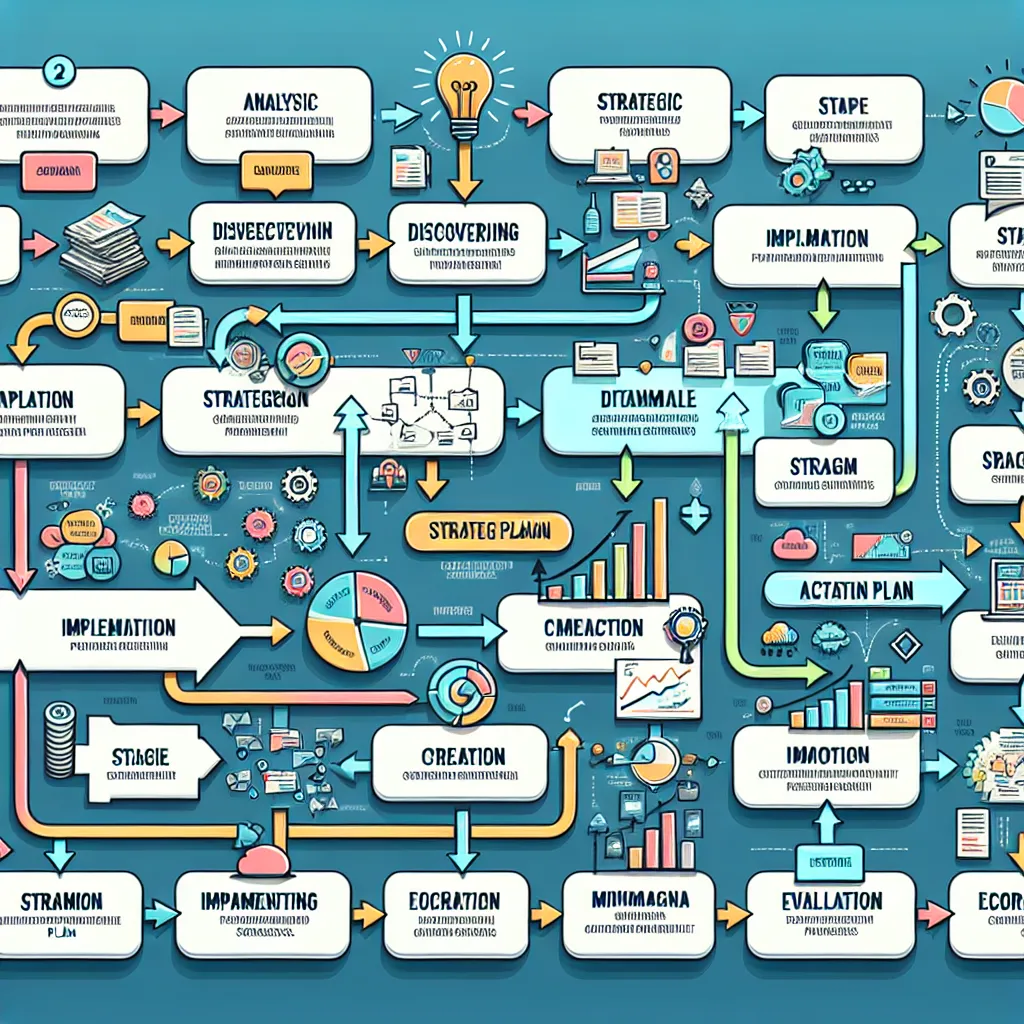Strategic planning is a crucial skill in many professional roles, and being able to effectively communicate your experience in this area can greatly enhance your chances of success during a job interview. Whether you’re applying for a management position, a consulting role, or any job that involves long-term planning and decision-making, showcasing your strategic planning skills is essential. This guide will provide you with valuable insights on how to articulate your strategic planning experience confidently and impressively.
Understanding Strategic Planning in the Context of Job Interviews
Strategic planning involves the process of defining an organization’s direction and making decisions on allocating its resources to pursue this strategy. It’s a skill that employers highly value as it demonstrates your ability to think long-term, analyze complex situations, and guide an organization towards its goals.
Why Employers Value Strategic Planning Experience
Employers look for candidates with strategic planning experience because:
- It shows leadership potential
- It demonstrates analytical thinking skills
- It indicates an ability to align daily operations with long-term goals
- It suggests you can handle complex, multifaceted projects
 Strategic Planning Interview
Strategic Planning Interview
How to Effectively Communicate Your Strategic Planning Experience
1. Prepare Specific Examples
When discussing your strategic planning experience, it’s crucial to have concrete examples ready. Consider the following structure for your responses:
- Situation: Briefly describe the context of your strategic planning experience.
- Task: Explain what was required of you in the strategic planning process.
- Action: Detail the steps you took in developing and implementing the strategic plan.
- Result: Highlight the outcomes and impact of your strategic planning efforts.
Example:
“In my previous role as a Marketing Manager at XYZ Company, I was tasked with developing a strategic plan to increase our market share by 15% within two years. I led a cross-functional team to conduct a thorough market analysis, identify key growth opportunities, and create a comprehensive marketing strategy. By implementing this plan, we not only achieved our 15% goal but exceeded it, reaching a 20% increase in market share within 18 months.”
2. Highlight Your Analytical Skills
Strategic planning requires strong analytical abilities. Emphasize how you:
- Gathered and interpreted data
- Identified trends and patterns
- Used data-driven insights to inform decision-making
Example:
“I utilized various data analysis tools to examine market trends, customer behavior, and competitor strategies. This analysis allowed us to identify a gap in the market for eco-friendly products, which became a key focus of our strategic plan.”
3. Showcase Your Long-Term Thinking
Demonstrate your ability to think beyond immediate challenges and consider long-term implications:
- Discuss how you aligned short-term actions with long-term goals
- Explain how you anticipated and planned for potential future challenges
Example:
“While developing our 5-year growth strategy, I not only focused on immediate market opportunities but also anticipated potential disruptive technologies in our industry. This foresight allowed us to allocate resources for R&D in emerging technologies, ensuring we stayed ahead of the curve.”
4. Emphasize Collaboration and Leadership
Strategic planning often involves working with diverse teams and stakeholders. Highlight your:
- Team leadership skills
- Ability to build consensus
- Success in communicating complex ideas to different audiences
Example:
“I led a team of 10 professionals from different departments to develop our company’s expansion strategy. By fostering open communication and leveraging each team member’s expertise, we created a comprehensive plan that was well-received across all levels of the organization.”
5. Quantify Your Results
Whenever possible, use numbers and metrics to illustrate the impact of your strategic planning:
- Revenue growth
- Cost savings
- Efficiency improvements
- Market share increases
Example:
“The strategic plan I developed and implemented resulted in a 30% increase in revenue over two years, along with a 15% reduction in operational costs.”
Common Interview Questions About Strategic Planning Experience
Here are some questions you might encounter, along with guidelines for crafting strong responses:
-
“Can you describe a significant strategic planning project you’ve led?”
- Focus on a project with measurable outcomes
- Explain your role, the challenges faced, and how you overcame them
-
“How do you approach the strategic planning process?”
- Outline your step-by-step methodology
- Emphasize how you incorporate data analysis and stakeholder input
-
“How do you ensure that strategic plans are effectively implemented?”
- Discuss your methods for tracking progress and maintaining accountability
- Highlight your communication strategies for keeping all parties aligned
-
“Can you give an example of how you’ve adapted a strategic plan in response to unexpected changes?”
- Choose an example that showcases your flexibility and problem-solving skills
- Explain how you identified the need for change and the steps you took to adjust
-
“How do you balance long-term strategic goals with short-term operational needs?”
- Discuss your approach to prioritization
- Provide an example of how you’ve successfully managed this balance
 Strategic Planning Process
Strategic Planning Process
Tips for Handling Difficult Strategic Planning Questions
Sometimes, you might face questions about strategic planning that are outside your direct experience. Here’s how to handle them:
- Be honest about your limitations, but show eagerness to learn
- Draw parallels between your experience and the question at hand
- Discuss theoretical knowledge you have, even if you haven’t applied it practically
- Explain how you would approach the situation if given the opportunity
Example:
“While I haven’t directly worked on a global expansion strategy, I have led regional expansion projects. I would approach a global strategy similarly, but with additional focus on cultural differences, international regulations, and global market trends. I’m excited about the opportunity to expand my strategic planning skills to a global scale.”
Common Mistakes to Avoid When Discussing Strategic Planning Experience
- Being too vague: Always provide specific examples and details.
- Overemphasizing your role: Be honest about your contributions while acknowledging team efforts.
- Focusing only on successes: Discuss challenges and how you overcame them to show growth and resilience.
- Neglecting the implementation phase: Don’t just talk about planning; emphasize your role in executing the strategy.
- Failing to connect your experience to the job you’re interviewing for: Always relate your strategic planning skills to the potential role.
Additional Follow-Up Questions and Response Guidelines
-
“How do you measure the success of a strategic plan?”
- Discuss key performance indicators (KPIs) you’ve used
- Explain the importance of both quantitative and qualitative measures
-
“How do you involve stakeholders in the strategic planning process?”
- Highlight your communication and facilitation skills
- Provide examples of how you’ve incorporated diverse perspectives
-
“Can you describe a time when a strategic plan you developed didn’t work as intended? What did you learn?”
- Choose an example that demonstrates your ability to learn from setbacks
- Explain how you adjusted your approach based on this experience
-
“How do you stay informed about industry trends that might impact your strategic planning?”
- Discuss your methods for continuous learning (e.g., industry publications, conferences)
- Explain how you incorporate new information into your planning process
-
“How do you ensure that a strategic plan aligns with an organization’s mission and values?”
- Discuss the importance of understanding the company’s core purpose
- Provide an example of how you’ve aligned strategies with organizational values
-
“How do you handle resistance to change when implementing a new strategic plan?”
- Highlight your change management skills
- Discuss strategies for building buy-in and addressing concerns
-
“Can you explain how you’ve used SWOT analysis or other strategic planning tools in your work?”
- Describe specific tools you’re familiar with and how you’ve applied them
- Provide an example of how these tools led to actionable insights
Conclusion
Effectively communicating your strategic planning experience in an interview requires preparation, specific examples, and a clear understanding of how your skills align with the potential role. By following the guidelines in this article, you’ll be well-equipped to showcase your strategic thinking abilities and make a strong impression on your interviewers.
Remember to practice your responses, stay confident, and always relate your experiences back to the job you’re applying for. Your strategic planning skills are valuable assets – make sure they shine through in your interview!
We encourage you to share your experiences or ask questions about discussing strategic planning in interviews in the comments below. For more interview tips and career advice, check out our articles on how to use hypothetical statements and best practices for learning grammar at an advanced level.




